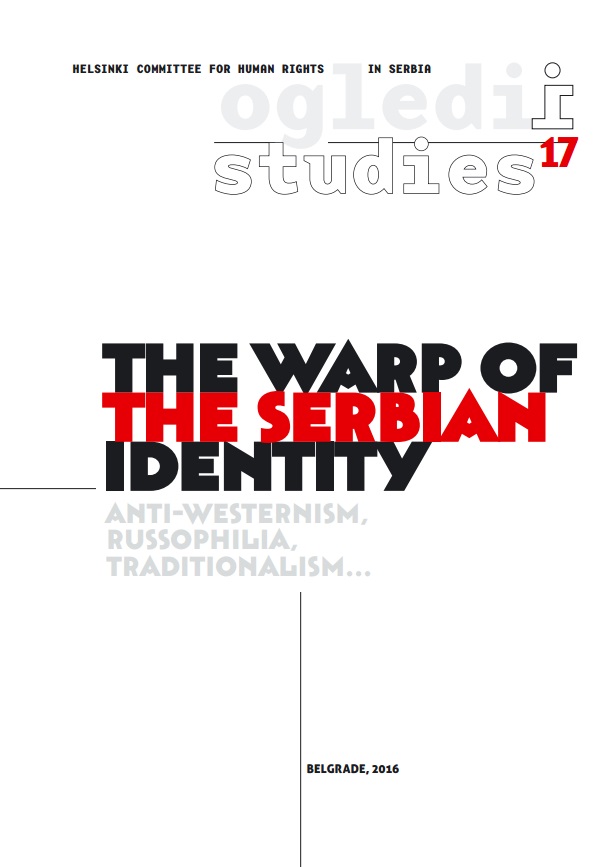The Warp of Serbian Identity
The Warp of Serbian Identity
Anti-Westernism, Russophilia, Traditionalism
Contributor(s): Sonja Biserko (Editor)
Subject(s): Politics / Political Sciences, Social Sciences, Political Theory, Politics and society, Nationalism Studies, Sociology of Culture, Social Norms / Social Control
Published by: Helsinški odbor za ljudska prava u Srbiji
- Page Count: 252
- Publication Year: 2016
- Language: English
Democratic Transition and Identities
Democratic Transition and Identities
(Democratic Transition and Identities)
- Author(s):Jovan Komšić
- Language:English
- Subject(s):Politics and society, Nationalism Studies, Inter-Ethnic Relations, Social Norms / Social Control
- Page Range:11-55
- No. of Pages:45
- Keywords:democratic transition; identity; nation; ethno-nationalism; citizenship; multiculturalism; political elites; Serbia; autonomy of Vojvodina; constitutional changes
- Summary/Abstract:By structuring his analysis into four key segments (1) Nationrelated contradictions and identity ambiguities; (2) Identity policies and multiculturalism; (3) Transitional identity engineering in Serbia, and (4) Projections of the future and prospects of multicultural strategies, the author corroborates the following thesis: regardless of numerous challenges of multiculturalism and dramatic open issues concerning the economic and financial crisis, as well as the refugee crisis, the EU policies of identity (both national and European) cannot preserve the advantage of the existing and globally unique civilizational values, nor can they prove their effectiveness in the consolidation of the democracy and integration of transition societies if the power to define identity is acquired (or preserved) by xenophobes and ethno-nationalists. Instead of traditional notions and (ultra)conservative (anti-)politics, the crisis requires new ideasand strategies. Therefore, multiculturalism should be given a real chance.
Serbian-Russian Historical Analogies
Serbian-Russian Historical Analogies
(Serbian-Russian Historical Analogies)
- Author(s):Latinka Perović
- Language:English
- Subject(s):International relations/trade, Nationalism Studies
- Page Range:57-81
- No. of Pages:25
A Different Russia: From Serbia's Perspective
A Different Russia: From Serbia's Perspective
(A Different Russia: From Serbia's Perspective)
- Author(s):Milan Subotić
- Language:English
- Subject(s):International relations/trade, Nationalism Studies, Social Norms / Social Control
- Page Range:83-104
- No. of Pages:22
The Role of the Serbian and Russian Orthodox Churches in Shaping Governmental Policies
The Role of the Serbian and Russian Orthodox Churches in Shaping Governmental Policies
(The Role of the Serbian and Russian Orthodox Churches in Shaping Governmental Policies)
- Author(s):Srđan Barišić
- Language:English
- Subject(s):International relations/trade, Politics and religion, Nationalism Studies
- Page Range:105-126
- No. of Pages:22
"Soft Power" in the Service of Foreign Policy Strategy of the Russian Federation
"Soft Power" in the Service of Foreign Policy Strategy of the Russian Federation
("Soft Power" in the Service of Foreign Policy Strategy of the Russian Federation)
- Author(s):Jelica Kurjak
- Language:English
- Subject(s):International relations/trade, Politics and society, Nationalism Studies
- Page Range:129-138
- No. of Pages:10
A "New" History for a New Identity
A "New" History for a New Identity
(A "New" History for a New Identity)
- Author(s):Milivoj Bešlin
- Language:English
- Subject(s):International relations/trade, Politics and society, Nationalism Studies
- Page Range:139-155
- No. of Pages:17
Russia's Soft Power Expands
Russia's Soft Power Expands
(Russia's Soft Power Expands)
- Author(s):Sonja Biserko, Seška Stanojlović
- Language:English
- Subject(s):International relations/trade, Nationalism Studies
- Page Range:157-166
- No. of Pages:10
Belgrade and Kiev between Brussels and Moscow
Belgrade and Kiev between Brussels and Moscow
(Belgrade and Kiev between Brussels and Moscow)
- Author(s):Boris Varga
- Language:English
- Subject(s):International relations/trade, Geopolitics
- Page Range:169-214
- No. of Pages:45
- Keywords:EU; Serbia; Ukraine; Russia; international relations; Ukrainian crisis; Syrian crisis
- Summary/Abstract:Using a comparative analysis of media and interviews, the author investigates the geopolitical position of Belgrade and Kiev in Europe, whereby the relations between the EU and Russia under conditions of Ukrainian crisis have fallen almost to the Cold War level. The research is focused on Serbia and its foreign policy, and the paper is divided into five chapters: (1) The Ukrainian Crisis and Russia, (2) The Ukrainian Crisis and Serbia, (3) Serbia Between the European Union and the Eurasian Union, (4) Conclusions and (5) Recommendations. The research is concerned with the course of events in Europe after the Ukrainian crisis, leading to the division into two political and economic blocs – the European Union and the Eurasian Economic Union – and their influence on the region of countries in transition, including Serbia and Ukraine. The author concludes that Belgrade and Kiev must be more resolute in implementing their refors and integrating into Euro-Atlantic structures if they do not wish to remain isolated or left to the influence of the growing power of the authoritarian states like Russia and China. This can also happen if Brussels ends its EU integration programmes for transition countries
More Politics than Business
More Politics than Business
(More Politics than Business)
- Author(s):Dimitrije Boarov
- Language:English
- Subject(s):International relations/trade, Political economy
- Page Range:215-234
- No. of Pages:20
- Summary/Abstract:The paper deals with economic relations between Serbia and Russia in the early 21st century in the context of the “European path“ designated by Serbian politics and traditional “political friendship“ between Serbian and Russian peoples on the Slavic and Orthodox basis. The main hypothesis is that, in essence, economic relations between Russia and Serbia are of marginal significance not only for the Russian Federation, but also for the Republic of Serbia, and that they provide almost no basis for the expansion of cooperation between the two countries or, more precisely, do not offer any realistic perspective in which Serbia’s economic cooperation with Russia would be an alternative to its inclusion in the European Union.
Serbian-Russian Joint Military Exercise
Serbian-Russian Joint Military Exercise
(Serbian-Russian Joint Military Exercise)
- Author(s):Petar Popović
- Language:English
- Subject(s):International relations/trade, Security and defense, Military policy, Nationalism Studies
- Page Range:235-239
- No. of Pages:5
Russia and NATO: a Test of Strength over Montenegro
Russia and NATO: a Test of Strength over Montenegro
(Russia and NATO: a Test of Strength over Montenegro)
- Author(s):Sonja Biserko
- Language:English
- Subject(s):International relations/trade, Security and defense, Inter-Ethnic Relations
- Page Range:241-252
- No. of Pages:12

